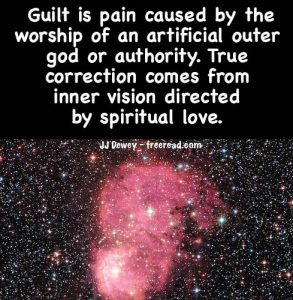
Texas Gathering, Part Five
Freedom from Guilt
Question: With what you’re saying about the forces coming in, what if the forces are your own internal working, like those who have the airplane and the ability to wind the propeller but then they say, “Oh but I’m not worthy.” The ego or lower personality gets in the way, even while you’re doing it, that feeling of I’m not worthy.
JJ: This feeling is very powerful. It is a real biggie. It’s like when I had that experience with that schoolmate and I felt the spiritual energy going through me so powerful I thought I must not be worthy to do anything like this. I actually ran home because I was worried that God was trying to strike me dead because I was just this mischievous little imp that was doing something wrong. I felt that I must not be worthy to do any healing. I’ve felt this a number of times in my life as I’m sure all of us have. Every time I have, it has made me go backwards rather than forwards. You have to get over this unworthy feeling.
When the scriptures talk about salvation, what they’re really talking about is being saved from this feeling of unworthiness. It’s really a first step because to be truly saved, as is talked about in the scriptures, you have to eliminate guilt. To eliminate guilt you have to establish a relationship with God in such a way that you recognize that you are a son or daughter of God. When you realize this and really understand this knowledge your guilt is swept away. That’s what true salvation is. It’s to be relieved from guilt. You will not have guilt about anything anymore as long as you live.
The word for ‘sin’ in the New Testament Greek means to shoot an arrow at a target and to miss. To miss the target is what the original word ‘sin’ meant. So, when, in Bible times, they said someone sinned, it means they missed the mark. “Missing the mark” is the literal English translation. It was used by archers back in those days when the Greeks shot an arrow at the target and used this Biblical word. Do you think they shot an arrow and after missing the target said, “Oh, I feel so guilty. I’m such a bad person I’m not going to shoot an arrow at the target again.” We don’t think that way. The original word ‘sin’ was not meant to convey guilt. It was meant to convey missing the mark. When we really miss the mark is when we let guilt enter in and over ride us so much that we refuse to even try again because guilt makes you feel like you’re not worthy. When you feel like you’re not worthy you don’t try again. You give up trying. I’m not worthy, I’m not good enough. I’m not going to try because God will probably be mad at me if I try.
But if you realize that the original word for ‘sin’ means merely to miss the mark, then we look at the people who lived in the time of Jesus in a totally different light. When Jesus said, “Sin no more” He meant don’t make anymore mistakes or bad judgments. So we must learn to be like the ancient Greek archers who, when they shot an arrow and missed the mark they didn’t say they were a terrible person. Instead they took another arrow and tried to shoot again and again. If they missed the bulls eye they tried another one and tried until finally they got it. That’s the way we are when we have achieved the salvation that Jesus taught. We keep trying and trying again. Remember the principle of self-correction? Like our bodies keep correcting themselves, we need to keep correcting ourselves until we finally hit the mark.
That is what true salvation is. True salvation is being able to over ride guilt and negate it. When we make a mistake, instead of condemning ourselves and feeling unworthy or feeling like God is angry at us, we merely say, “Give me another arrow and I’m going to shoot again and hit the mark. I’m going to try again to be a good person. I’m going to try again until I become the type of person I want to be and nothing is going to stop me.” This is actually the true meaning of salvation. We’re saved from guilt which is the biggest missing of the mark there is, which means it is the biggest sin and when you’re saved from guilt you’re saved from your sins. And when you’re saved from guilt you have peace of mind. When you’re saved from guilt and make a mistake you no longer feel condemned. You merely think, “I made a mistake. I’ll try again.” You still have peace. Nothing takes away your peace because you know you’re doing the best you can, you know you’re human, you no longer have guilt about it and you just try again just like you would if you were shooting an arrow at a target.
So, this is an important thing in the point of tension. If we let guilt enter in, the little propeller we’re winding up will end up winding up backwards. The tension begins to be dissipated so that the tension will no longer be there. We must not let guilt enter in no matter how big of mistake we make; it’s just a mistake. You probably don’t want to do it again so let’s move ahead.
Think. If you have a son or a child and he/she makes a mistake, do you want him to feel guilty about it? If he’s willing to pick up and try again aren’t you going to nurture him? Aren’t you going to help him move ahead and support him? Jesus said, “if we being evil know how to give gifts to our children, will not God, being good know not how to do much more than we know how to do?” Yet we think that we will help our children when they fall down but if we fall down God will throw us in hell where we’ll burn forever. We’re going to suffer with this tremendous guilt and God will laugh with glee. No, Jesus didn’t say that at all. He said God is much better than us. He will give much better gifts and much more to His children than we can to ours because in comparison to God, we are very flawed. God is much better than us and He will be able to imagine much greater gifts for His children than we can for ours.
Isn’t that a wonderful teaching to contemplate? Yet how many of the churches teach it? How many of the churches instead teach, “Boy, God’s going to take care of you! All the angles in heaven are going to laugh with glee when they get a hold of you in the next life because you haven’t gone to church lately. You haven’t done some silly little thing that conforms to what some man here on the earth wants you to do.
Guilt is a tremendous method of control. Every person in this room is worthy of the presence of God. If you don’t feel worthy it’s because you’re deceived. Someone has tricked you to think that you’re not. Yea, but I’ve done some naughty things. Like Rob over here has done some naughty things over the past week, right Rob? (laughter) You’ve been a very naughty young man! It doesn’t matter what you’ve done. Nothing can stand between you and the presence of God except for you. You’re the only one that stands in between. If we are really the children of God and God is capable of going much farther in helping His children than we are in helping ours. How far would you go to help your children? Who has kids here? Somebody with a kid raise your hand. Garrett, how far would you go to help your kid get through college?
Response: Whatever it takes
JJ: Say your kid had a car accident and hurt somebody. He didn’t mean it. It was an accident. Would you condemn him? You wouldn’t, would you? What would you do for him? Suppose he was crying and feeling terrible. He was guilty. It was a terrible mistake. Would you be happy to see him suffer? Then why do people think that God is happy to see us suffer? Isn’t that about the biggest deception you can think of? If Jesus was right when He said, “God will go many more steps and He’s much better at giving good gifts to His children than we are to ours.” Yet look at how far Garrett will go to help his kid, even though he had an accident and it was his own fault. He didn’t mean it but it was a stupid thing that he did. The kid is condemning himself. What does Garrett do?
Response: Help him to realize it was just an accident. To do all he can do to correct it then move on with his life.
JJ: Do you give him a big hug to make him feel better? You do, don’t you? And Rob here, even though he’s done some naughty things over the week and irritated somebody he’s working with, he probably even irritated one of his teachers at school. Rob wants to be embraced by God. Do you think God is going to say you don’t deserve a hug? This is the true non-judgmental attitude. It’s that of a father or mother or parent accepting their children when they make a step in a forward direction they will accept them no matter what, especially if the child is making a step in a forward direction. Even though he’s guilty as all get out, the parent will accept him, even parents of murderers or really dastardly people. Human parents, no matter what the kid does, are still there to help them. Most loving parents will be. So no matter what we’ve done there is nothing to remove the barrier between us and the presence of God except for us. We’re the ones who condemn us. It’s just a natural thing that happens when we ourselves, are deceived.
So perhaps the greatest thing that I could present tonight is that every single person is worthy of your next step. Whatever that next step is, you are worthy of it. But when you take it every force in the world will come and try to convince you that you’re not ready, you’re not worthy and you shouldn’t take it or you’ve made a mistake in taking it. You need to go backwards, back to where it’s safe.
So, to create the point of tension, perhaps the most important thing is to take that step to decide then to focus on that decision and follow the highest you know within yourself. Moving ahead following the highest you know continues to create the point of tension as you wind up the little rubber band engine on the little airplane we’re visualizing. As you wind that up by moving ahead and focusing and not retreating, the point of tension is created. When the point of tension is there, you will sense it and things will begin to happen. If you want to go into the next stage of consciousness where you have communion between you and the spirit of God, when the point of tension is reached, one of the greater lives will say, “Behold the seeker has moved a step forward. Let us go greet him. Let us go commune with him. Let us sup with him and he will sup with us. Let us share our presence with him. Let us unfold a new energy with him that he has not felt before and see how he handles it.”
When you have created that point of tension and you’re proceeding along the spiritual path a new energy will unfold within you. It will be something that you’ve never really felt before. You may have felt things in the past but there are new things. You will feel a new energy, a higher energy and you will eventually adjust to it until this new energy becomes a part of your life. Then there is another step after that. There is always another step as long as you’re living here as a mortal being there is always another step in this sphere that we’re in. If you are here and you’re capable of pinching yourself and feeling something you have another step to take. Don’t be deceived into thinking that you’ve taken all the steps that you need because there is always another step to take.
So I want everyone to focus on the idea of drawing the attention of the Christ and His associates and Him sending us an endowment of spiritual energies that we can feel the presence of higher spiritual energies. I know a number of people have desired this and haven’t reached that point yet and want to reach it. There is nothing to stop us. If everyone in this room can stay focused and believing and positive in their mindset, not feeling any ill will toward any other person, not letting any negativity circulate, then we as a group can be elevated together to where we have never gone before.
To this end I’d like to end this meeting with a group prayer that we’ll all say together. Part of the reason for this is that I’ve had several people tell me that as soon as they decided to come to this gathering or think about coming to the gathering that all hell seems to have broken loose in their life. It seemed like something didn’t want them to come here. I know a number of you have told me about this and probably a number who have not mentioned it have also had this happen. I have felt this energy pulling on the group and it seems like the negative energy gave up a day or two ago because it realized it wasn’t going to stop you people from coming. So I’m glad to see everyone here.
Some people here are worried about people at home. So, what I’d like to do is to do a group prayer together and send energies to all of our loved ones so that everyone here can be at peace within themselves, knowing that all of their loved ones are taken care of, wherever they are. I’ll say the words then after I say them, everyone repeat them after me.
Our Father/Mother/God, hallowed be thy name
Let your presence be here upon the Earth as it is in heaven
Let our presence be in heaven as it is upon the Earth
May your spirit be one with our spirits
We call upon you with great faith
And send forth love to all mankind
We know that by the power of faith the innocent are protected
And we send this power to all of our loved ones
That they will be protected from harm
That their spirits will be elevated
That the love of God will surface in their hearts
That they will sense a fullness of joy on the horizon
That we all may be comforted in one
Through the One Spirit
Aumen, Aumen, Aaauuummmen
Aaaaaaaaaaaauuuuuuuuummmmmmmmmenn
Delivered May 24, 2002 at the Gathering in Wimberly Texas.
Copyright By J J Dewey
Easy Access to All the Writings
For Free Book go HERE and other books HERE
JJ’s Amazon page HERE
Gather with JJ on Facebook HERE

